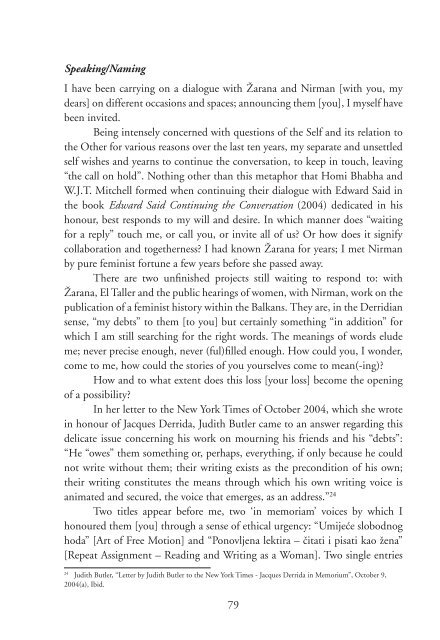Teaching Subjectivity. Travelling Selves for Feminist ... - MailChimp
Teaching Subjectivity. Travelling Selves for Feminist ... - MailChimp
Teaching Subjectivity. Travelling Selves for Feminist ... - MailChimp
Create successful ePaper yourself
Turn your PDF publications into a flip-book with our unique Google optimized e-Paper software.
Speaking/Naming<br />
I have been carrying on a dialogue with Žarana and Nirman [with you, my<br />
dears] on different occasions and spaces; announcing them [you], I myself have<br />
been invited.<br />
Being intensely concerned with questions of the Self and its relation to<br />
the Other <strong>for</strong> various reasons over the last ten years, my separate and unsettled<br />
self wishes and yearns to continue the conversation, to keep in touch, leaving<br />
“the call on hold”. Nothing other than this metaphor that Homi Bhabha and<br />
W.J.T. Mitchell <strong>for</strong>med when continuing their dialogue with Edward Said in<br />
the book Edward Said Continuing the Conversation (2004) dedicated in his<br />
honour, best responds to my will and desire. In which manner does “waiting<br />
<strong>for</strong> a reply” touch me, or call you, or invite all of us? Or how does it signify<br />
collaboration and togetherness? I had known Žarana <strong>for</strong> years; I met Nirman<br />
by pure feminist <strong>for</strong>tune a few years be<strong>for</strong>e she passed away.<br />
There are two unfinished projects still waiting to respond to: with<br />
Žarana, El Taller and the public hearings of women, with Nirman, work on the<br />
publication of a feminist history within the Balkans. They are, in the Derridian<br />
sense, “my debts” to them [to you] but certainly something “in addition” <strong>for</strong><br />
which I am still searching <strong>for</strong> the right words. The meanings of words elude<br />
me; never precise enough, never (ful)filled enough. How could you, I wonder,<br />
come to me, how could the stories of you yourselves come to mean(-ing)?<br />
How and to what extent does this loss [your loss] become the opening<br />
of a possibility?<br />
In her letter to the New York Times of October 2004, which she wrote<br />
in honour of Jacques Derrida, Judith Butler came to an answer regarding this<br />
delicate issue concerning his work on mourning his friends and his “debts”:<br />
“He “owes” them something or, perhaps, everything, if only because he could<br />
not write without them; their writing exists as the precondition of his own;<br />
their writing constitutes the means through which his own writing voice is<br />
animated and secured, the voice that emerges, as an address.” 24<br />
Two titles appear be<strong>for</strong>e me, two ‘in memoriam’ voices by which I<br />
honoured them [you] through a sense of ethical urgency: “Umijeće slobodnog<br />
hoda” [Art of Free Motion] and “Ponovljena lektira – čitati i pisati kao žena”<br />
[Repeat Assignment – Reading and Writing as a Woman]. Two single entries<br />
24<br />
Judith Butler, “Letter by Judith Butler to the New York Times - Jacques Derrida in Memorium”, October 9,<br />
2004(a), Ibid.<br />
79

















